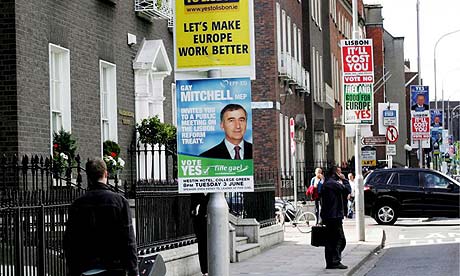
Irish Voters Likely to Sink EU Treat, Poll SHows
Ian Traynor in Brussels

Dublin lampposts carry posters with conflicting messages as political parties step up their campaigns ahead of the referendum vote on the Lisbon Treaty. Photograph: Aidan Crawley/EPA
The latest opinion poll shows those intending to vote against the EU's reform treaty doubling in strength in recent weeks, soaring to a five-point lead over the Yes camp.
A vote against the treaty would sink the ambitions of Berlin, Brussels and Paris to reshape the EU by giving it a sitting president, foreign minister, a diplomatic service, a new voting system and decision-making powers, and streamlining the European commission.
After previous negative referendum results in Ireland, France, and the Netherlands over the past seven years, an Irish rejection would also be hailed - at least by Eurosceptics - as a massive vote of no confidence on the way the EU is run.
Ireland's governing and main opposition parties, all strongly in favour of the treaty, were panicking yesterday, despite the news earlier in the week that Ireland's farmers would finally back the treaty.
An Irish Times poll showed the treaty opponents have made meteoric gains, doubling from 17 to 35% in recent weeks, while the treaty's supporters slumped from 35 to 30%. With just five days to go before the only popular vote on the treaty in a union of 27 countries, the Yes camp faces an uphill struggle to reverse the momentum for ditching the treaty.
"The referendum is heading for defeat," said an editorial in the pro-EU Irish Times. "There is a dramatic shift in public opinion towards a No vote ... The government and its allies may find it impossible to turn the tide. The Lisbon treaty may not be passed."
Treaty opponents believe loopholes will mean Ireland loses control in areas such as tax, trade, abortion and military neutrality. Pro-treaty parties have accused them of scaremongering.
As an amending treaty, augmenting and revising previous European treaties, the document is an indigestible compendium of articles, legalisms, and protocols. It matters. But it is not an easy read. This factor is contributing hugely to the No campaign's success in turning the Irish against the new dispensation.
Analysis of Friday's poll results showed that confusion was the key to turning voters against the treaty. Many voters said they were voting no because they could not understand the treaty.
The Lisbon treaty, masterminded last year by Angela Merkel, the German chancellor, and signed by EU leaders in December, is the response to the failed attempt to craft a constitution for Europe, a campaign wrecked by French and Dutch No votes in 2005.
The new treaty retains most of the institutional innovations mooted in the draft constitution, but is stripped of the symbolism of constitutionality.
In Brussels, Irish officials are worried the vote will be lost. Dick Roche, the Europe minister, has warned friends his government is in trouble. "He felt it could go badly. He's worried about losing," said a source who spoke to Roche this week.
The referendum campaign contributed to the resignation of the Irish prime minister, Bertie Ahern, last month. A No vote could bring down his replacement, Brian Cowen, who said on Friday that he would take responsibility for the result.
Ireland, uniquely in the European Union, is constitutionally bound to stage referendums on EU treaties, meaning that less than 1% of the EU's population of more than 450 million has the power to determine the fate of European treaties.
www.guardian.co.uk/world/2008/jun/07/eu.ireland
